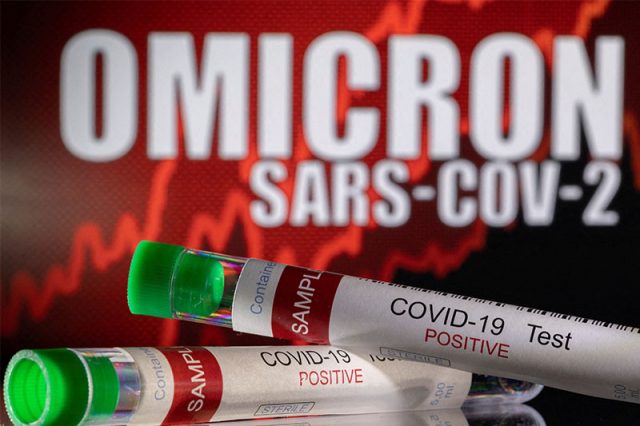
The following is a summary of some recent studies on COVID-19. They include research that warrants further study to corroborate the findings and that has yet to be certified by peer review.
Spreading version of Omicron resists all but one new drug
Until Friday, just one COVID-19 antibody drug has been effective against the Omicron variant – sotrovimab from Vir Biotechnology and GSK – and that drug is unlikely to do as well against at least one new version of the variant spreading globally, new research suggests.
An antibody drug approved on Friday by the U.S. Food and Drug Administration does show promise when tested against “sublineages,” or subvariants, of Omicron, the research found.
The World Health Organization is monitoring several Omicron subvariants. Data posted on Wednesday on bioRxiv ahead of peer review showed that the rapidly spreading BA.2 subvariant “exhibited marked resistance” to sotrovimab in lab experiments, researchers said.
Britain-based GSK announced on Thursday, without formally releasing any data, that its drug does retain the ability to neutralize BA.2 in a test tube.
David Ho of Columbia University, senior author of the bioRxiv report, said his research “also showed that sotrovimab still has activity against BA.2, consistent with their statement.
But its activity is down substantially, 27-fold as stated in our preprint.”
In repeat experiments, the drop was even more pronounced, he said of testing done after the paper was submitted.
The drug approved on Friday – bebtelovimab, from Eli Lilly, remained potent in neutralizing all Omicron subvariants, Ho’s team said.
Two antibody drugs from AstraZeneca – cilgavimab and tixagevimab – did remain effective against BA.2, but they are only approved for preventing COVID-19 in certain circumstances, not for treating it.
Second-line Omicron immune defense deficient in some people
T cells, a key component of the body’s immune defenses, may not work well against the Omicron variant in some people, according to new research.
T cells learn to recognize germs either during natural infection or after vaccination.
When invading organisms slip past antibodies, T cells launch an attack to prevent severe illness. Researchers studying 76 volunteers found that most individuals’ T cells continued to defend against Omicron even when their antibodies did not, regardless of the source of the antibodies, including from booster shots.
But about 20% of people had more than a 50% reduction in their T cell response to Omicron, compared to responses to earlier variants, the researchers reported in Cell. This “surprising” finding might be due to genetic differences, said Dr. Gaurav Gaiha of the Ragon Institute of MGH, MIT and Harvard.
What the decrease in T cell recognition of Omicron means is unclear, “but it is possible that these individuals will have reduced protection against severe disease,” Gaiha said.
It could also mean SARS-CoV-2 “can evolve to escape even T cells, so we have to continue work on vaccines that may be resistant to future variants, and keep taking sensible precautions like mask-wearing and testing,” added Gaiha, who noted that vaccine boosters “dramatically increased the T cell response to Omicron by 20 times.”
New or persistent health problems follow COVID-19 in seniors
Older adults infected with SARS-CoV-2 before vaccines were available were at higher-than-average risk for needing medical care for a persistent or new problem in the months afterward, according to a report published on Wednesday in The BMJ.
Researchers studied nearly 133,000 Americans over age 65 who had coronavirus infections in 2020 and a roughly equal number of closely matched uninfected individuals. Nearly one-in-three COVID-19 patients sought medical attention at least three weeks after diagnosis for a new or persistent condition, an 11% higher rate than researchers saw in the comparison group.
The COVID-19 patients were at increased risk for respiratory failure (an additional 7.6 cases per 100 people), fatigue (an extra 5.7 per 100 people), high blood pressure (an extra 4.4 per 100 people), and mental health diagnoses (an extra 2.5 per 100 people), the researchers found.
When the COVID patients were compared to people previously infected with other respiratory viruses, like flu, only new problems with respiratory failure, dementia, and fatigue were more common after COVID-19.
Although hospitalized patients were at higher risk for new or persistent problems, “the larger population… who did not require admission to hospital for COVID-19 were still at risk,” the researchers said.
—Reporting by Nancy Lapid; Editing by Bill Berkrot and Grant McCool









